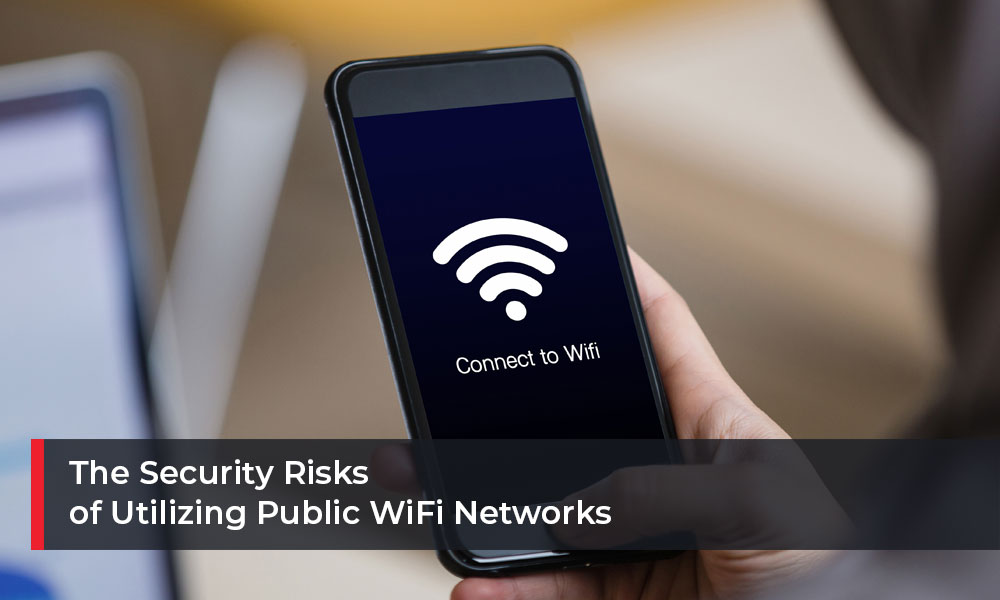Mobile devices are multiplying at a rapid pace, with road warriors accessing enterprise applications from airports, hotels, restaurants – nearly anywhere. Signs offering “free WiFi” can be seen in nearly any coffee shop or public place, with many occupants taking full advantage of the capability.
Checking and sending emails, streaming videos, and playing games are popular uses of public WiFi networks, but many individuals also take the opportunity to place orders for goods and services, access bank accounts, or conduct private business transactions.
How safe is it to utilize public WiFi networks, and what are the security risks?
What are the Security Risks of Using Public Wi-Fi Networks?
One primary answer to why consumers and business travelers use public WiFi is – because they can. WiFi performance is more common and robust than ever before, with wireless technology providing solid connections and high-speed data transfer.
Whether using public WiFi for business or pleasure, the risks are the same.
It’s critical to keep in mind that when accessing public WiFi, any data exchanged with that network can be monitored or intercepted by other devices on the network.
One important consideration when connecting to public WiFi is the level of unknowns:
● Who set up the network?
● Is antivirus software in place, and if so, is it kept updated?
● Who else is using the network at the same time?
Keep in mind that if you can access the network, anyone on the same network can see you, the websites you visit, and the data that you exchange.
Cybercriminals take full advantage of WiFi vulnerabilities to capture privileged information such as user names, passwords, and especially credit card numbers and bank account information.
Hackers are armed with software that makes life easy for them. Once your tablet, smartphone, or laptop connects to public Wi-Fi, cyber thieves may abscond with your files, photos, and even your contact lists or bank account numbers. Anything on your device is fair game to these criminals.
How to Stay Safe on Public Wi-Fi Networks: 8 Tips
With the risks of using public WiFi, mobile users need to take appropriate precautions to minimize exposure.
1. Use Common Sense
Accessing Wi-Fi in reputable places you’re familiar with carries far less risk than unknown networks that just pop up on your phone or tablet.
2. Pay Attention to the URL for Internet Sites You Visit
Avoid unsecured sites that start with HTTP, especially on public WiFi. HTTPS designation assures you that the site is secure and utilizes encryption. Hackers cannot view the information passed between your device and the website.
3. Use VPN
VPN – Virtual Private Networks incorporate software and secure technology in passing data over public WiFi. By installing and using VPN technology, all data is encrypted to provide security, providing the same level of privacy as if connected directly to a private network. This prevents eavesdropping by other devices who may also be on the WiFi network, protecting users from any detection of user and password information.
4. Limit the Information Provided to Sign Up
Many Wi-Fi networks ask for some basic user information including creating an account and password to use the service. Use caution in providing too much personal data to access the network. This may be legitimate, such as retailers seeking your email address to contact you with promotions. Consider it a red flag if personal information such as credit card or social security numbers is requested.
5. Turn Off File Sharing
When accessing public Wi-Fi networks, change your settings in Windows to avoid unintentionally permitting access to data files on your pdevice. With Mac devices, set AirDrop options to “Contacts Only” to safeguard your privacy.
6. When Not Using Wi-Fi, Turn It Off
This not only is a good habit to get into that shuts out cyber thieves, but it saves battery power, as well.
7. Use a Mobile Hotspot
Dispense with public Wi-Fi entirely by investing in a mobile hotspot that lets you tether your tablet or smartphone directly without the use of public WiFi. Mobile hotspots connect to a cellular network – now supporting even 5G networks – and allow you to connect multiple devices to the hotspot as though you’re on a secure public network. These vary greatly in performance and price but offer maximum connectivity on the road.
8. Keep Your Applications and Browser Updated
This includes the use of antivirus and malware protection. Apps and browsers are constantly being updated to patch vulnerabilities as they’re discovered. This is one simple and effective way to ensure WiFi access is as safe as possible.
Adhering to these basic safeguards will help make you and your devices more secure when accessing public WiFi networks.
DSI – Managed IT Solutions
Document Solutions, Inc. (DSI) offers our clients in El Paso and the New Mexico region with secure, managed IT services. We provide state-of-the-art wireless networking and cybersecurity protection with antivirus and malware detection.
Contact DSI for information on our complete managed IT solutions that keep your applications and data secure with cloud-managed technology.

